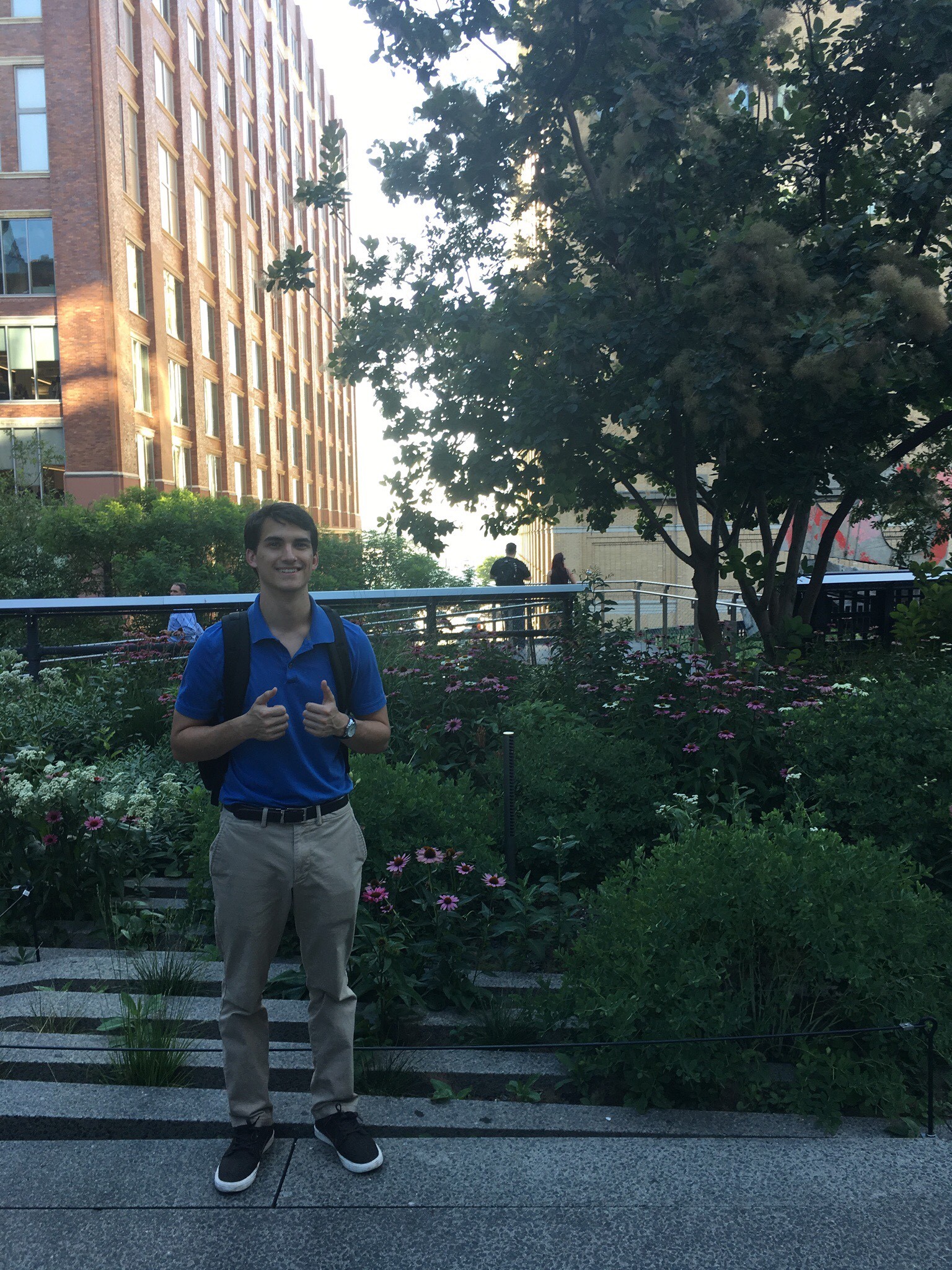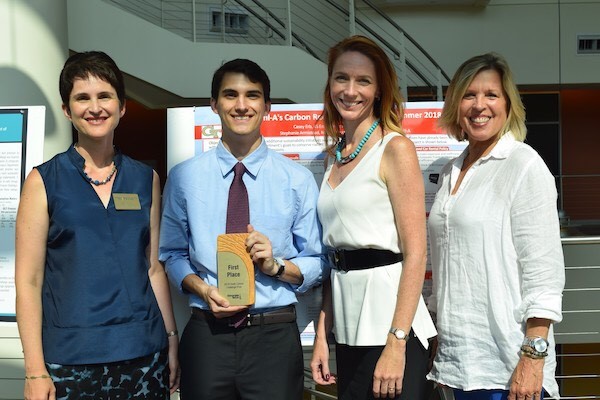As we inch ever closer to the end of the spring semester, students are gearing up for summer internships where they will gain hands-on work experience and make valuable contacts. This is also the time of year when organizers behind Georgia Tech’s Carbon Reduction Challenge (CRC) will begin their campaign to enlist new recruits. Students who accept the Challenge commit to an additional responsibility on top of their regular co-op duties: to research and propose carbon- and cost-saving measures at their places of employment. Is the extra work—during such a critical time—worth it? I answer with a resounding yes. Participating in the Summer 2018 CRC at Chick-fil-A was a profoundly educational experience, and I was able to make a real-world impact on business and the environment.
I signed up for the CRC the summer after my sophomore year at Georgia Tech. Why? The simple answer is that I believe in the collective responsibility to “do good.” I came to that belief growing up in Johns Creek, Georgia, with a mother who is a T.A.G. elementary school teacher. I credit her with providing me countless opportunities for creative problem-solving. Also, like a lot of kids, I loved wild animals. When I started to learn about climate change and its impacts on wildlife, I thought, “This is fundamentally wrong, and there must be something I can do.” I also always enjoyed math and science. In elementary and middle school, I tested concepts of renewable energy with miniature water wheels, wind turbines, and solar panels. My path eventually led me to Georgia Tech, where I major in Environmental Engineering—a field that is rapidly developing and cutting-edge in both technology and management. While it’s valuable to learn theories of sustainable practice in the classroom, I saw the CRC as the opportunity to do something concrete to help the environment.
"Participating in the CRC at Chick-fil-A helped me gain an understanding of how idealism for being responsible for the environment has to balance with a company’s financial decisions."
My intern coach at Chick-fil-A, Stephanie Armistead, was just as excited as I was to work on the CRC, and I think it was her collaborative spirit that led to our success. Stephanie even showed up for the CRC orientation—an event that not even all of the students attended. As the only mentor who was present, she joked, “I’m doing a good job intimidating the other teams!”
While the CRC is typically an additional sustainability project outside an intern’s normal work, for me it was a little different because I was interning in Chick-fil-A’s Sustainability Department. Although the department may be small in number, it makes decisions that can have a profound impact on Chick-fil-A and its public image. My normal internship duties involved quantifying and performing cost-benefit analyses for various sustainable initiatives at Chick-fil-A, such as installing rooftop solar panels and EV-charging stations at franchises. Part of my job focused on sustainability-focused education within the company, so I organized a Lunch-and-Learn panel on Georgia Tech’s Living Building. I also conducted competitive landscape analysis…My job was to research companies within the industry and to identify useful precedents in Chick-fil-A’s path to sustainability.

Casey Erb interned in Chick-fil-A's Sustainability Department, where he worked on quantifying and performing cost-benefit analyses for various projects such as installing rooftop solar panels and EV-charging stations at franchises.
When it came to the separate realm of the CRC, Stephanie and I looked at projects that could be implemented before the end of the summer. The tricky part of this is assuming that the summer of the competition is the optimal time to make a change, but this isn’t always the case. For instance, we thought about proposing adjustments to the corporate shuttles—six Ford 14-passenger vehicles that transport employees on campus. We thought we could replace this fleet with more fuel-efficient vehicles. However, since the fleet was a capital investment that had just been leased, we realized it wouldn’t be a smart business decision to replace it immediately. As of spring 2019, with Chick-fil-A’s campus expanding, the company is now considering switching to electric shuttles.
This idea to modify transport on campus, in addition to several other ideas, had to be dropped when we realized there were more feasible options to pursue. In the end, three proposals reached trial or implementation phases at Chick-fil-A.
We worked alongside the Design and Construction Team to pilot parking lot LED retrofits at 21 locations. This idea was already in progress since an existing Chick-fil-A partner had already been selected to install the retrofits. I didn’t have to do too much groundwork, but I did the math: If Chick-fil-A implemented LED retrofits in x many stores, what would be our carbon reduction and cost savings? My contribution helped Stephanie to throw the Sustainability Department’s hat into the ring with the Chick-fil-A Design and Construction team. Twenty additional LED retrofit pilots were approved for the 2019 fiscal year, saving a total of $27,000 and 190,000 pounds of CO2per year.
Second, we worked on a project that was already in-progress: to replace the task of washing dishes by hand with dishwashers. A research team had already picked out an industrial dishwasher that would save employees two hours per day from what is generally the least pleasant task for team members. The complexity of Team Members’ daily experience could be decreased with the addition of dishwashers—and labor hours could be saved. The idea to install dishwashers had traction, but the proposal hadn’t included water and energy savings, so I supplied that. These additional figures helped to move the proposal along. As of the poster session at the end of the CRC, dishwashers had been installed in 60 franchises. The plan is to install a dishwasher in every Chick-fil-A that has enough kitchen space.
The third project had to do with changes to the company’s car rental program. We encouraged travelers to switch from low-MPG (and more expensive) vehicles to high-MPG (and less expensive) vehicles. Our research found that corporate travelers wanted to do the right thing for the environment but were unaware of just how much their collective cost and carbon could be abated. We added a note on the car rental website that reminds travelers that in the spirit of being good stewards they may wish to select a vehicle with better gas mileage. We also launched an internal educational campaign about the impact corporate travelers’ choices can make.
The greatest obstacle we faced was not a lack of ideas or a lack of enthusiasm; we had both in spades. Our biggest challenge was generating internal support for our projects within the span of a summer. We had to go for the lowest hanging fruit. Ultimately, our projects with the largest capital costs faced the most resistance. Even a company as purpose-driven as Chick-fil-A has ROI expectations for proposed projects. But the ethical backbone of Chick-fil-A was our path to a middle ground. Once our internal stakeholders were convinced that our projects were the right thing to do for the company, commitments were made to perform low-risk trials.
Participating in the CRC at Chick-fil-A helped me gain an understanding of how idealism for being responsible for the environment has to balance with a company’s financial decisions. The best sustainability solutions bring cost savings and environmental benefits together. A company’s first responsibility is to keep the lights on. Forward-thinking companies are philanthropic and environmentally conscious, but they can’t be those things effectively without first being a profitable business.
Patience and time are the allies of successful organizations, and taking the first step toward change is often the most difficult stage of implementation. It is easy for an idealistic intern who wants to save the world to fail to see the importance of patience and due diligence when making business decisions. Even for successful companies, resources are scarce and must be allocated judiciously. The most important lesson I learned last summer is that anything worth doing is worth doing right.
Casey Erb is an Environmental Engineering major earning an Engineering and Business minor with the Steven A. Denning Technology & Management Program. He won First Prize ($5000) in the 2018 Carbon Reduction Challenge for teaming up with Chick-fil-A staff to abate 330,000 pounds of CO2 per year while delivering $440,000 of cost savings per year.
